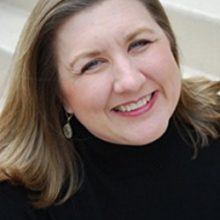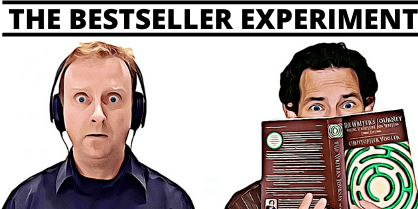EP37: Go For Launch | Susan Kaye Quinn

PODCAST
In this episode you will discover…
-
The ideal model for debut pre-orders.
-
How long you should promote your book for.
-
How to make your blurbs work harder.
-
And how to use tropes to satisfy your readers.
Thanks for listening and joining us. Have some feedback you’d like to share? Leave a note in the comment section below.
SPREAD THE LOVE
If you enjoyed this episode, please share it using the social media buttons you see at the bottom of the post.
SUBSCRIBE, RATE & REVIEW ON ITUNES
Please do subscribe on iTunes and leave an honest review for The Bestseller Experiment Podcast on iTunes. Ratings and reviews are extremely helpful and greatly appreciated! They do matter in the rankings of the show, and we read each and every one of them. Don’t forget, when subscribing to the show on iTunes you will get automatic updates.
If you have any questions, you can contact us here.
Episode Highlights:
- Bestseller Experiment: Facebook | Twitter (@bestsellerxp) | Instagram | Pinterest
- Scrivener – Software for Writing
- Susan Kaye Quinn: Website | Twitter | Facebook | Facebook Group| Pinterest
- Co-Hosts:
Links featured in today’s show:
- Bestseller Experiment’s Vault of Gold. Sign up to get your free Writer’s ebook
- Question Mark: Have a question you want answered on the show? Click here.
EPISODE TRANSCRIPT (HIGHLIGHTS)
In the second part of our interview with Susan Kaye Quinn, we talk about how to launch your book, pre-orders, fan-service, promoting your books, the dark art of blurbs, the power of tropes and mythology.
What’s your advice for launching a book?
I don’t recommend pre-orders, first of all. It drains away your ranking on launch day, especially when it’s your first book. You want everything to push on the first week. I have a model for bookselling — this is what works — and then then I get more information in and I tweak the model, so I’m constantly tweaking the model, but the current model for new authors, launching their first book, my model is that you want to leverage that first thirty days to let Amazon know that you are just frickin’ awesome. You can just debut and sell a crap-ton of books all at once, and you’re amazing, and they should totally sell your books for you. It’s all about convincing the Amazonian gods up there to boost your book for you. I recommend starting in Kindle Unlimited, because the Amazon gods like that. I recommend debuting strong in the first week, because the Amazon gods like that as well. If you are successful you will get on the hot new releases list, which means for that first thirty days you have automatic visibility, and that visibility is everything.
Push it in that first week, get all your subscribers ready to go that first week.
Actually, release your book a week ahead, but don’t tell anybody and buy ads. A week’s notice is enough to buy a lot of ads. Launch it at a discount. Get it going, and then you can get on that hot new releases list, you’ll have that visibility. If you actually have some momentum there with your sales, you may just keep going.
I would say one in a hundred people actually do that, and I’ve seen it happen with Annie Bellet. She is an amazing writer, wrote all these short stories, was very traditional for a long time, trying to grab that golden ring, finally decided to write a new series, and she was the one in the one hundred. She launched that thing and my God if it didn’t just take off. She sort-of inadvertently did all the right things. Although, not too much inadvertently, I think a good 75% of that, she knew exactly what she was doing. She wrote an amazing book, she wrote it in a hot genre, she’s a huge fan of the genre. This is another secret; if you’re a huge fan of the genre, you don’t even have to write well. If you just pack it with all the tropes, people will be ‘Oh, this is so great!’
Fans are actually the best writers. If they knew how to write we’d all be out of business.
Annie, on the other hand, is a fantastic writer, too. She’s giving them all their tropes, and she’s a fantastic writer. That book just took off, and has been selling strong ever since, and she has made a whole career out of that series. She’s still writing in it two years later. So that’s my strategy to get started.
How do you long pro-actively promote a book for?
Forever. Seriously. I’m actively buying ads for books I wrote five years ago. You have to. There’s an infinite sea of readers out there and if you don’t keep fishing, guess what, you’re not going to have new fish It doesn’t end. I was talking to a friend of mine who is unpublished, and she just wants to stamp that card and say, ‘I am published,’ because she’s been working at it so long, and I totally get that you want to hit that milestone. The problem with that is this idea that everything will be better. And it’s just not.
Everything is so much harder once you’re published, because now you have to bifurcate yourself; here’s the publishing arm and here’s the writing arm, and somehow the writer arm still has to have time to produce more content to feed the machine. And this marketing one has to keep going, too, because if you’re not promoting all the time, your life is more difficult.
Give yourself the gift of having time to write. Even write two or three books. Have it in the can to go, so that you’re not totally insane for that first ninety days to six months.
Have a plan, take the data, see how you’re doing, then decide do I even want to do this? I know so many people who launch that first book, and even if they do it well they don’t get around to the second book for so long and everything dies, and then they’re depressed, and it’s a horrible cycle. The biggest hammer you can hit is publishing a book, so if you can go one-two-three with your books in three months, or six months, now you’ve got not only the momentum of the first week, you’ve got the momentum of the first months. Amazon’s like ‘Woah, you’re the real deal, you’re here to stay, you’re actually doing more!’ You actually have a chance to grow it, plus you buy yourself the sanity to decide if that’s something you can actually keep doing.
You don’t have to keep going like that forever. My pen name does, my pen name is kinda crazy. She publishes every month. She’s not going to do that forever, but she’s going to do that for a couple of years, which is also crazy.
You don’t have to do it forever. You can have the first three, and then the fourth one can be months later. Not years. Years is too long. And now you’ve got breathing room, because you’ve already got momentum from the first three.
How do you write your blurbs and how much time do you spend on them?
I spend one hour on average. That’s because I’ve written a million of them. One thing to really know about blurbs is it’s very genre-dependent. This is not something I knew right away. It’s like telling the first fifty percent of your book to whatever point you want to leave people at with the ‘Oh no, what are they gonna do?’ You have the introduction, ‘In a world where this and that happens, you’ve got Joe and he’s really troubled by his past, then he meets this girl and she’s amazing but she’s a leopard, and they have problems because of leopard catchers and what are they gonna do? Because leopard people can’t marry regular people and, besides, they’re gonna kill her!’ I’d wanna read that, right?
A blurb is flash fiction, only you don’t end it.
You leave it with the open, where you reveal something, but you don’t close it, so people are like, ‘What’s gonna happen next?’ or you leave them with a choice where he’s got to choose a or b. And it can’t be, ‘Well, obviously he’s going to pick a,’ it has to be, ‘Wow, he’s really screwed, I’ve got to read that book.’
How you write that in an actual craft sense varies by genre, and I didn’t get this until I started writing in my pen name. The first few books for pen name I wrote science fiction blurbs for her. She’s romance!
Go to the top twenty books in your genre and see how they write their blurbs.
When I say genre I mean actual category listings on Amazon. You’ll have some consistency there in the way people write their blurbs. And they change over time, that’s the other thing, so check in on that when you’re getting close to publishing and see how things have shifted For romance, there’s a lot of ‘he said/she said’ blurbs: ‘Caden is a man who was an oil rigger until he lost his mother and then he’s been despondent ever since… and the woman is a paediatric nurse who really loves kids, but she can’t have any of her own until she meets this guy…’
You set up this dynamic that’s telling the story in opposing voices, which is what your story is.
Even if your story is entirely in first person-present tense, you’re going to write that blurb as the two people, because it’s the story of the relationship. Completely different from my dystopian science fiction, where the very first thing is; ‘This is a world where everyone reads minds, except for one girl, and she controls them instead.’ We don’t know who the girl is, we don’t know what her problems are, but we enter with the world, we start with world building because science fiction is all about awe, it’s all about world. So you intrigue the mind first, because that’s what people are in it for, then you start talking about character.
You have to figure out what your real story is, and the number one thing that people say to me — when I say pick your category, target your cover to your category, target your blurb to your category — the number one thing that people say to me is, ‘But, see, I’m an exception to this, because my book is actually a thriller-zombie-romance, and no one’s ever written this before, and so there are no examples, and it crosses many genres.’
I don’t care. Pick one and market to that.
More importantly Amazon is doing the work for you. It is pre-sorting, out of the two million books that are on Amazon, it’s going to tell you the ones that do best. These ones do best, here they are, the bestsellers list. And here you have an automatic sampling of what resonates with your audience. Read ten of the blurbs in your category and see if that is what your book is like. For example, if you’ve got a bullseye for science fiction here, and a bullseye for romance here, and you’re wide of the mark on either one of those, you’re not necessarily going to sell. It’s hitting the bullseye that matters for selling. My other book For Love Or Money talks about this. Make sure you’re in the right category, it makes a difference.
On the power of tropes:
What really matters is how you hit the tropes. We had a whole thread about this on the For Love Or Money group for a while, about how the fetish of uniqueness. It may seem old to you, but it’s not old to the reader, and the reader wants more of that. And they want more of that same thing, but with a fresh twist. You really have to get over the whole thing of it’s not unique enough.
The For Love Or Money book really talks about that dichotomy of writing in genre, and writing out of genre for love. I’m not trying to hit the market, I’m not trying to target the tropes, I’m writing that weird mermaid sea-tentacle romance because it’s just fascinates the hell out of me. That’s totally okay, and you may or may not sell, but it is a fulfilment of the human spirit to write what calls to you, so for God’s sake please do that, please! The world needs more of that. Even if the entire world is just what’s between your ears, you need to do that.
Part of your purpose for being here is to write the things that are important to you.
At the same time, you may choose to do the ‘For money’ books as well, and that’s really okay. You gotta pay the bills, everybody’s got to eat. They don’t have to be the same book. I’m the queen of split personality. I have these books that are total mercenary books, and total ‘For Love’ books. I am writing about future boys who are in love with robots… like that’s gonna sell? No. Oh, and let’s put religion in there, right? No. Actually, it kinda sells, but it’s the book of my heart, and I have to write that story, and I’m obsessed with that story. But, if I actually wanted to make money, I wouldn’t write that book. It screws every trope, so badly.
Find out where your box boundaries are.
I find out what my tropes are and I make my box. These are the lines out of which I may not stray. That’s what the market wants. Within that box, I can do anything I want. I can play hard, I can bring in imports from fairy tales, from shifter romance, and I’m gonna mix it all up, because as long as I stay in that box… I don’t have to do the dumb things that are in the box, I just have to not go over the boundaries. Be very careful about being afraid of tropes. Tropes are just a story. A story that everybody’s loved for a long time, that’s all it is, and they probably still love it.
If somebody wrote Romeo and Juliet today, with a fresh twist, it would sell like hot cakes, and it does. It has! How many times has Romeo and Juliet been rewritten and called West Side Story or whatever the next reincarnation of it is?
There is a fantastic book I would recommend called The Storytelling Animal, it talks about why story works for us. What goes on in our brain, neurochemically, and what is the purpose of story in our consciousness, in our dreams, in our everyday life. It’s fascinating, and one of the things they talk about is how myths, legends, fairytales, are stories that have evolved over time as the collective wisdom of humanity has been told and re-told and distilled and mangled, but passed on, which should tell you something.
The stuff that endures, does so for a reason, and it touches something inside us.
But it has to be updated, because have iPads and Reddit and my life is different now than when we had some weird minotaur thing doing I don’t know what, or some god came down as a bull and impregnated some woman. We have to reinterpret and update stuff, but you’re tapping into what Chris Vogler said was the best of humanity, the divine. It’s Prometheus bringing down the fire. Tropes are a version of mythology. They’re the thing that collectively we’ve decided means something. It’s up to you to take it and make it into something really relevant to your readers today. Really respect the hell out of your reader. A lot of people who write romance, or think that they want to write romance, don’t really respect the romance reader. I respect the hell out of that person, because they are the romantics. They’re searching for one of the best things that we do, which is love each other. And they love it so much, they want it again and again and again, and they want to be re-affirmed that you can be strong and still be in love, that you can heal, all these different tropes that romance novels have are great stories of humanity. I love people who love those books. I was that way before I started writing them, but I’m even more so now, because I get to interact with them, I get to hear what they like and don’t like about the stories and what they do for those people.
The fluffiest novel that you write, no matter what it is, you’re shining a light into some dark spaces that people have in their lives, you’re bringing something to them. When you get published, you’ll get to see that for yourself.
SHARE THE MEMES…
VIDEO TRAILER
SHARE THE PODCAST WITH A FRIEND
SUBSCRIBE TO THE BESTSELLER EXPERIMENT PODCAST!


